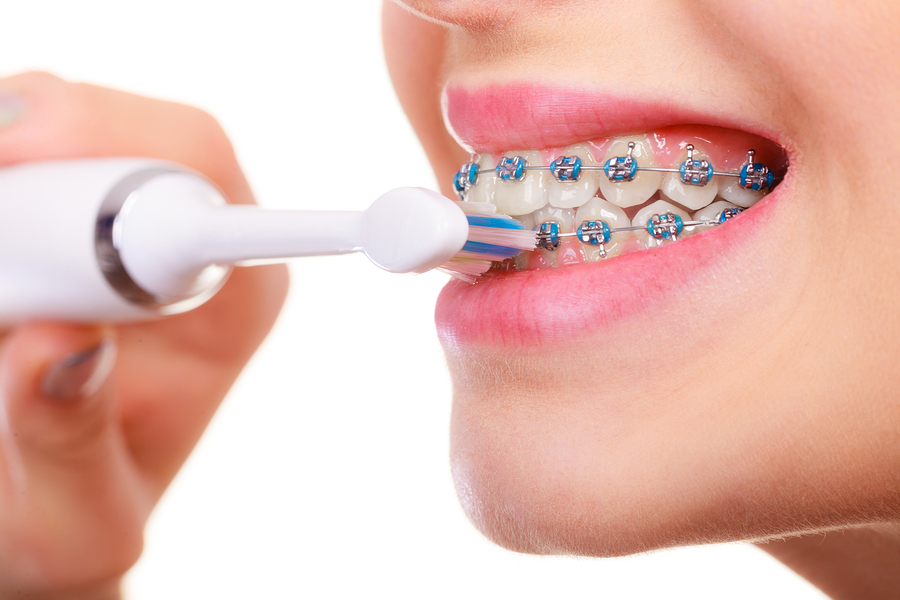How Important Oral Hygiene with Braces?
Meticulous maintenance of oral hygiene is mandatory while you have braces. Poor oral hygiene may make you to visit your dentist for some others reasons. Orthodontic appliances do not cause caries per se. However, strict oral hygiene regime should be followed as brackets, wires or other accessories may act as niche and harbor bacterial growth, and can cause bad breath, staining, decalcification, caries and gum problems.
You may find white spots on teeth below brackets called as Decalcification spots. They can grow up to become caries in case of unimproved oral hygiene.
Also Read: Foods we should avoid with Braces
On an average Orthodontic treatment lasts for 18 months. During treatment and even after commencement of treatment, goal of Orthodontic treatment is not only to straighten your teeth for radiant smile but to make your dentition self-cleaning, stable functionally or structurally and healthy.
8 Tips for Oral Hygiene Maintenance with Braces
Below are some easy guidelines to follow throughout your treatment to make sure good oral hygiene maintenance when wearing braces. I am sure it doesn’t need too much time, and demands just few extra minutes from your daily routine.
-
Tooth brushing and tooth paste on teeth with braces
- Remove any removable appliance or elastics before brushing.
- Brush after every meal (and before bed), at least three times a day, for at least two minutes each time.
- Use Fluoridated toothpaste to prevent cavities, decay and decalcification.
- Use Soft-bristled manual or electric toothbrush or Orthodontic brush, specifically designed for the braces.
- Orthodontic brushes are similar to regular toothbrush, except central row of bristles is shorter than adjacent rows to be gentler on brackets
- You can customise your normal brush too by simply clipping the central row of bristles.
- Don’t brush your teeth very hard, use gentle and small circular movements at an angle of 45-degree angle to the gum line.
- Spend about 10 seconds on each tooth before moving onto the next tooth.
- May need to replace your toothbrush more often when you have braces.
- Incorrect brushing can irritate gums or even cause tooth sensitivity or unnecessary wear on your enamel or breakages.
- Start brushing from one side of your mouth, top or bottom, and work your way around to the other side. Follow up set pattern to brush your teeth so that no tooth is left untouched.
- Interdental brush: Interdental brushes are used to clean areas between your brackets and under wires to help easily dislodge food particles.
-
Flossing of teeth with braces
Flossing helps dislodge food particles and plaque that may accumulate under the gum. It can also help reach small areas and spaces that your toothbrush may miss. Dental floss should be a complement to a good brushing technique but cannot replace it. -
Mouthwash for braces
Anti-Bacterial Mouthwash and fluoride mouthwash is a highly effective adjunct to daily brushing and flossing. Antibacterial mouthwash is effective in reducing plaque accumulation, gingival inflammation. Fluoride containing mouthwash can prevent caries and remineralise deminerlised enamel. -
Disclosing Tablets for braces
Disclosing tablets are chewable tablets used to make plaque visible. These tablets contain a dye that stains plaque a bright color (typically red or blue). Chew tablet after brushing and rinse. Colored stains on the teeth indicate areas where plaque remains after brushing, providing feedback to improve brushing technique. It is a great visual aid and motivational tool for brushing for children and adults alike. -
Mirror to keep an eye on braces
Always keep a small mirror with you. Use your mirror to check behind your teeth and in the back to make sure you have brushed properly. -
Tooth pick for braces
I always encourage my Orthodontic patients to keep few tooth picks. This can act as a quick fix when you are out for a party or place where you cannot brush your teeth. You can remove entrapped food particles with a tooth pick. Even rinsing vigorously with water is helpful. -
Look for food you eat
Avoiding foods that could increase your risk of developing tooth decay. Cut down or eliminate foods with an excess of sugar, like soda, sweets, and ice cream. Do not consume sticky food like chocolates. Avoid hard food like candies, pizza crusts etc. -
Regular Dental Visits
Please don’t miss your follow up check schedules. Regular visits to your dentist is essential to make sure that your teeth are healthy and clean. Your dentist can point out to the areas that require more attention in terms of oral hygiene care.
Frequently Asked Questions on Dental Health
1. Oral Cancer- Early Signs and Risk Factors
2. Midline Diastema – Causes and Treatment Options
3. 5 Dental Treatments to Enhance Your Smile
4. Importance of Dental Visit for Infants
5. Dental Tourism in India – Advantages and Disadvantage
6. Can Eating Disorders effect Dental Health?
7. How to Reverse Tooth Decay and Dental Caries with Diet?
8. Complete Information on Mouthwash for Dental Health
9. Dental Myths and Facts in Society-by Dr. Sushma Sharma(Dhiman)
10. Oil Pulling-Benefits, Tips and Methods for Dental Health
11. 4 Great Tips to Help You with Your Smile Makeover
12. What Are The Early Signs Of Gum Disease?
13. 7 Ways to Treat Gapped Teeth Effectively
14. Should I Go to the Dentist When I’m Sick?
15. Habits Start Young: 4 Ways to Implement a Healthy Routine for Your Kids
16. Receding Gums: Causes, Symptoms, and How to Treat Them
17. How to Get Your Biggest, Brightest, and Whitest Smile
18. How Menopause affects Oral Health?
19. Tongue tie in children-know all about the symptoms and cure
20. How to Deal with Black Spaces in your Teeth
21. The Effects of Enlarged Tonsils on Dentition
22. 8 Amazing Benefits Of Baking Soda And Lemon for teeth
23. What Should we Eat and Avoid with Braces?
23. 9 Traditions to Dispose of Lost Milk Teeth
24. Home Remedies and Prevention for Mouth Ulcers
25. Know about the Symptoms, Types, Prevention of Mouth Ulcers
26. Oral Hygiene Maintenance with Braces




